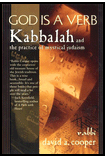
Humans are CoPartners with Goding in the Creation
As long as we relate to God as father and we as children, we sustain the dysfunctional paternalistic model in which father knows best. We not only remain alienated with a sense of abandonment, we relinquish our personal sense of responsibility. We think father will take care of everything.
The Talmud records a wonderful story of a debate over an esoteric point of law in which one sage, Rabbi Eliezer, stood alone against dozens of other sages.
He tried every conceivable argument to convince his peers, to no avail. Finally, exasperated, he said, "If the Law [God] agrees with me, let this carob tree prove that I am right." At that moment, the carob tree flew out of the ground. Some say it moved 150 feet, others say 600 feet. But the sages were not convinced and they responded, "You cannot prove anything from a carob tree."
So, Rabbi Eliezer said, "If the Law agrees with me, let this stream of water prove that I am right;" whereupon the stream reversed itself and began to flow uphill. The sages once again replied, "Proof cannot be brought from a stream of water."
Rabbi Eliezer persisted. "If the Law agrees with me, let the school house walls prove that I am right." It is said that the walls of the school house began to lean inward, but before they could fall, another sage, Rabbi Joshua yelled at the walls, saying: "When scholars are involved in a dispute about the law, what right do you have to interfere?" At this the walls stopped leaning inward. It is said that in honor of Rabbi Eliezer they never went completely upright. But, in honor of Rabbi Joshua, they did not fall. Rather, they remained on a permanent slant.
The story does not end here. Rabbi Eliezer stubbornly called out, "If the Law agrees with me, let heaven prove that I am right!" At this, a bat kol, a heavenly voice, thundered against all the scholars: "Why do you argue with Rabbi Eliezer? Do you not know that the Law always agrees with him!"
One would think that this would be sufficient for the sages to change their minds, but not so. At this point, Rabbi Joshua stood up and quoted a verse from Deuteronomy: "The commandment which I command you is not hidden from you, nor is it far. It is not in heaven that you should say, 'Who will go up to heaven and bring it to us that we can hear it and do it?' Nor is it beyond the sea that you should say, 'Who will cross the sea and bring it to us that we can hear it and do it?' But the word is very near you, in your mouth and in your heart that you may do it."
Rabbi Joshua's position was that the Torah was given at Mount Sinai so that earthly matters were now mankind's domain, and heaven should not interfere. This astounding talmudic assertion indicates that human reason carries precedence over heavenly mandates. It strongly declares complete independence in interpreting the laws of Moses. In many ways it is definitive evidence in support of the total freedom of free will. The sages voted and defeated Rabbi Eliezer despite that fact that God was clearly on his side!
The Talmud goes on to record a conversation between Rabbi Nathan and the prophet Elijah, who spoke with him from heaven. Elijah frequently conversed with sages when they were dreaming or in various trans-states. In this exchange, Rabbi Nathan asked out of curiosity what the Holy One did at the time of this debate between Rabbi Eliezer and the sages. Elijah responded that the Holy One had laughed and had said to all of the angelic hosts (with obvious pleasure): "My children have defeated me!"
Judaism is noted for its chutzpah in its relationship with the creative force. The Torah describes a number of biblical events in which Abraham or Moses repeatedly argue with God until their point is made; that is to say, until God changes Its mind, so to speak. Moreover, biblical commentators depreciate Noah because he did not argue with God about the destruction of the world but meekly built the ark when told to do so. Clearly, the word of God in Judaism has never been viewed as a final decree but as divine intention that can be debated and in some instances reversed.
According to Kabbalah, the linchpin of our relationship with God is founded on the belief that human beings have creative capability to intervene in the "normal" course of events. One word, one gesture, or even one thought can change the direction of the creative process. This being so, we are led to conclude that human beings play a co-creative role.